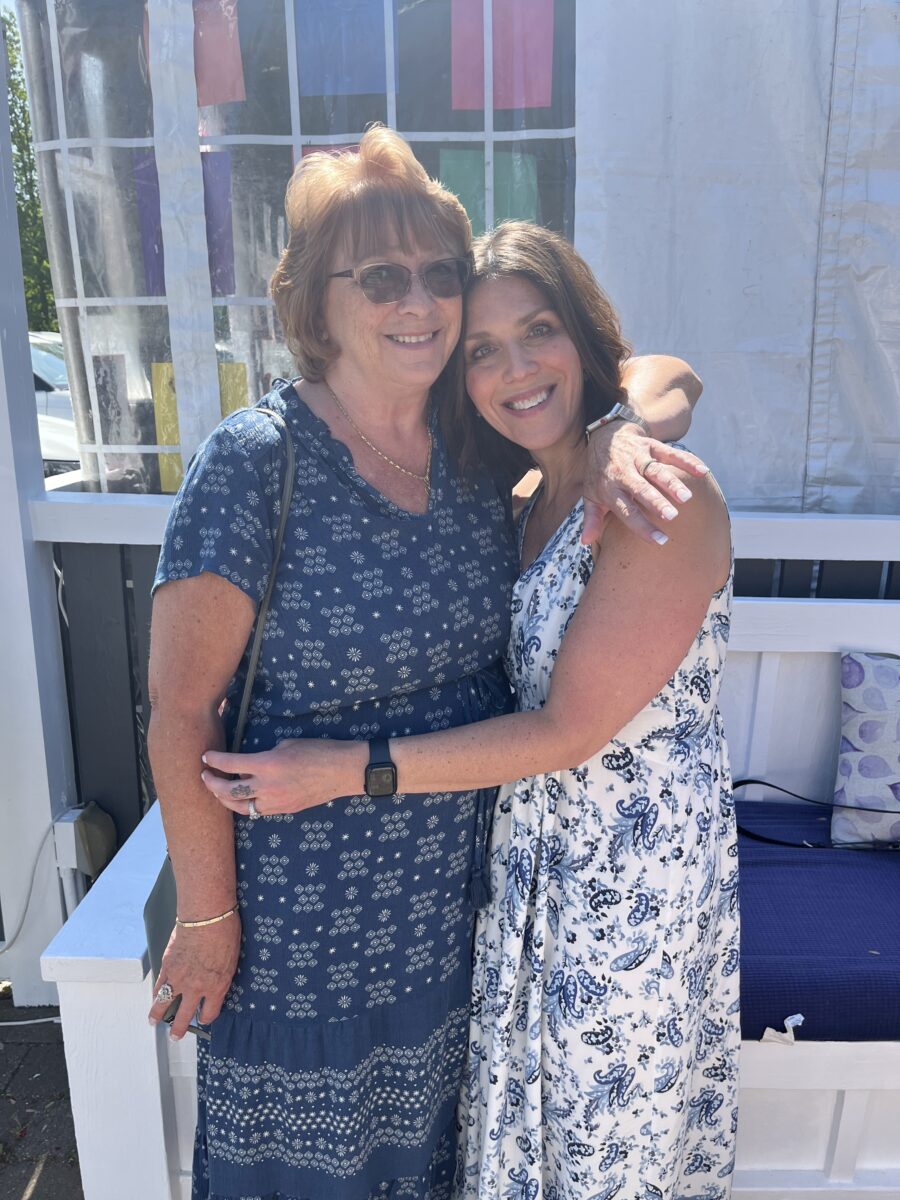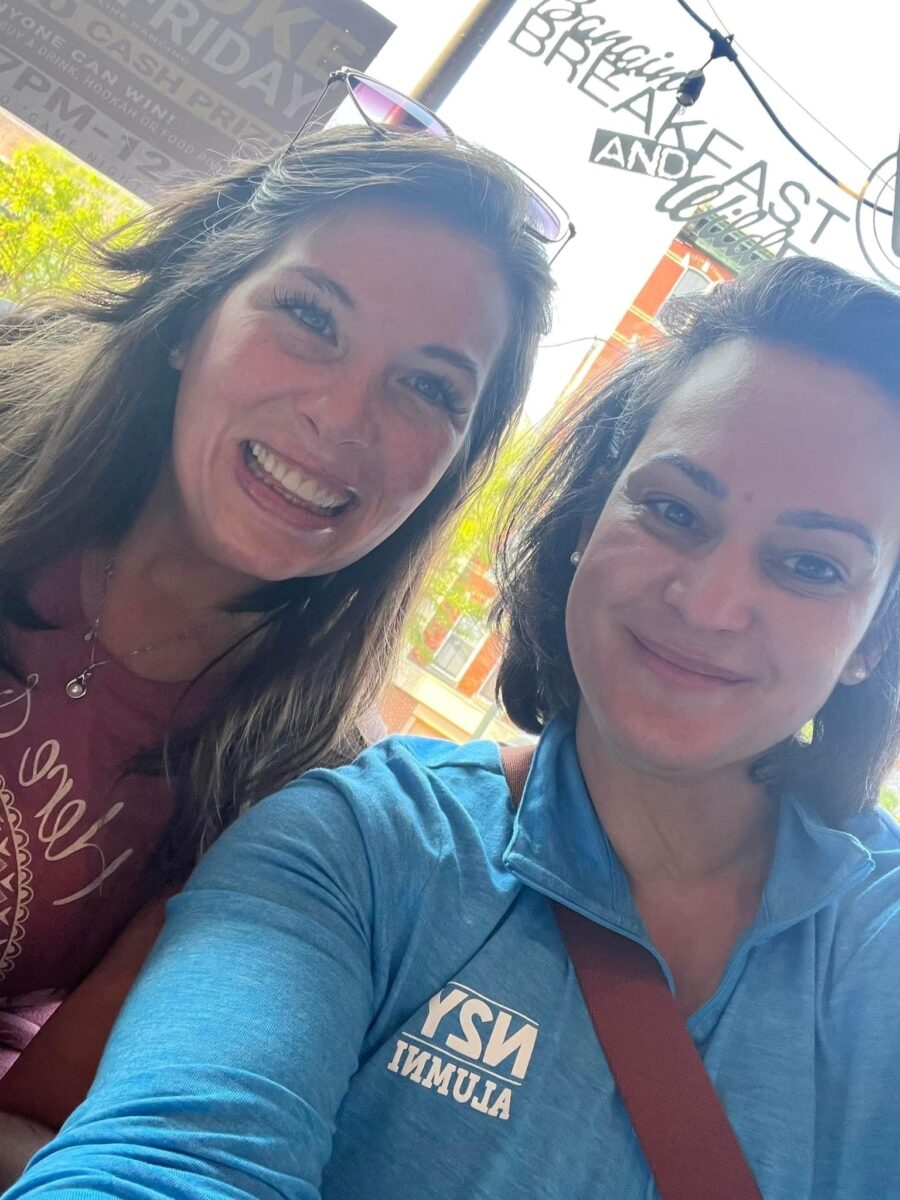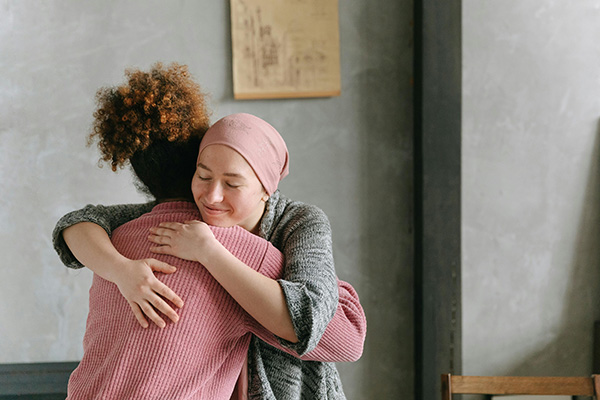Balancing Act
The Importance of Boundaries for Individuals Affected by Cancer
by Beth Blakey, Marielle McLeod, and Stephanie Rouse
Cancer can be a deeply personal and private journey. No one should face it alone, but many feel obligated to share more about their experiences than they are comfortable with as those around them offer support. While setting boundaries is difficult, it is important for the well-being of those touched by cancer. Here are a few tips we have as a cancer caregiver, previvor, and survivor that we hope will help you along the way.
Caregiver Boundaries – Beth’s Story

For cancer caregivers, the weight of responsibility can be soul-crushing. When I was a caregiver for my mom, I struggled. Between helping my dad with her, being a wife, mother of two young kids, sister and aunt, and running my own business, I was physically, mentally, and emotionally drained. I wish I’d known then what I know now about how important it is to find healthy ways to put your own oxygen mask on first so you can give your loved one the care and support they need. This requires recognizing your physical, mental, and emotional limits.
Know your limits
When you are in the thick of it, it’s easy to develop compassion fatigue. I didn’t have the energy for social activities, the headspace for other people’s problems, or the wherewithal to ask for help. I felt guilty for being overwhelmed and weak for feeling scared. My mom needed me, and I wanted to be there. Despite how tired, busy, frustrated, or weak I felt, I showed up. I ran myself into the ground and landed at the doctor’s office repeatedly for various illnesses related to stress and fatigue. My mom worried about me, which was the last thing she needed. It’s critical to understand what you can realistically handle in terms of time, energy, and resources and then plan around them.
Make space for you
Accept that it’s okay to prioritize your needs. Recharge and pursue activities that bring you joy. It’s not selfish—it’s necessary for sustaining your caregiving role. Whether it’s taking breaks for relaxation, pursuing hobbies, or seeking support from groups or organizations like Cancer Hope Network, it’s essential to nurture yourself so you can continue providing effective care without burning out.
Previvor Boundaries – Stephanie’s Story
As a cancer previvor, setting boundaries is important for maintaining control over your health journey while navigating the complex landscape of risk management and preventative measures. It involves establishing clear guidelines for yourself and others in discussions about your health, decisions about medical interventions, and boundaries around personal space and privacy.
Set Your Own Timeline
For me, this took time. I was diagnosed with Familial Adenomatous Polyposis (FAP) at 21 years old with no family history. I was overwhelmed, scared, angry, and processing dozens of other emotions all at once. Family and friends didn’t know how to act around me, and I didn’t have the energy to care for years. Everything changed at 30 years old. I had a very serious surgery and had to fight harder than I’d ever fought to make it through. After three months in the hospital (almost half of that in the ICU), I finally went home. That experience opened my eyes. For years, I felt my diagnosis meant my life wasn’t valuable. Surviving taught me the opposite. In my survivorship, I opened up and began vocalizing my experience with friends and family to help me process what I’d gone through.
Establish Guidelines
I’ve found you need to clearly map out what information you are comfortable sharing and what topics are off-limits. When I started sharing my experience, some felt it was acceptable to tell my story without my consent. Some even felt it was okay to take out their trauma on me. By this point, I found the strength to communicate that I would no longer tolerate such hurtful behaviors. I set boundaries for myself that reflected my value—that demonstrated that my life is worth living and I am enough. Recognize when you need out of stressful situations or overwhelming conversations to protect your mental and emotional health.

Survivorship Boundaries – Marielle’s Story
Setting boundaries is essential for reclaiming autonomy and maintaining a sense of balance in life after cancer. This was very difficult when I was first diagnosed, but is becoming easier, seven years out. It meant recognizing and respecting my limits and developing boundaries around work commitments, social engagements, and self-care routines.
Step Back
I lost my job during my cancer fight and it rocked me. I lost my self-esteem, plus some. When I rejoined the workforce after completing treatment, I took on every task and project to prove to myself that “I could do it” and I still had it in me. I was becoming depressed and so overwhelmed that even the slightest mistakes would send me into a downward spiral. Eventually, I took a step back and set hard boundaries for myself personally and professionally.
Advocate for Yourself
I needed to advocate for my well-being the same way I encouraged others to do so. Within a short time, I noticed the improvement. If I am not the best version of myself, what good will I be to help others overcome tough times? Having boundaries keeps me safe and allows me to prove my worth and demonstrate that I am capable of being and doing much more. They provide the space to thrive during, through, and after your diagnosis on your own terms.
Advocating for yourself begins with honoring what your body and mind are telling you. Listen when you need rest or are feeling overwhelmed. Focus on activities that contribute positively to your well-being while avoiding overexertion and harmful stress.
No matter the stage of the cancer journey, we’ve found communication is key. Prioritize your well-being and let others know, including friends, family, and coworkers, what you’re comfortable with and what you need to maintain it. Remember, setting boundaries isn’t just about drawing lines—it’s about fostering understanding, respect, and empowerment.
Cancer Hope Network provides free and confidential 1:1 peer support for adult cancer patients and those who love them. Beth Blakey is Executive Director and COO of Cancer Hope Network. She was a cancer caregiver for her mother. Marielle McLeod is an AYA colon cancer survivor and Director of Programs & Advocacy at Cancer Hope Network. Stephanie Rouse is a cancer previvor who serves as the Cancer Support Coordinator at Cancer Hope Network. Visit Cancer Hope Network at CancerHopeNetwork.org.


